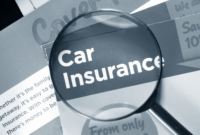Comparing Actual Cash Value with Agreed Value
The actual cash value (ACV), or current market value, of the vehicle serves as the foundation for coverage under standard auto insurance plans. This may be far less than a collector car's true value, particularly in the case of vintage or limited-edition vehicles. After investing a lot of time, money, and affection into repairing a classic automobile, imagine just getting a small portion of its actual worth in the case of a complete loss. Car insurance with agreed value removes this danger.Here's the key difference:
- Actual Cash Value (ACV): This is the standard for most car insurance policies. It considers the car's age, mileage, condition, and current market value to determine the payout in a total loss scenario. For collector cars, this can be a significant disadvantage.
- Agreed Value: This is the cornerstone of collector car insurance. You and your insurer come to a mutual agreement upfront on a predetermined value for your car. This value considers factors like the car's condition, rarity, restoration work (if applicable), and current collector car market value. In a total loss situation, you'll receive the agreed-upon value, minus your deductible, ensuring you're not left short-changed.
Benefits of Agreed Value Car Insurance
Choosing agreed value car insurance for your collector car offers several advantages:
- Guaranteed Payout: Peace of mind is paramount. Agreed value ensures you receive the pre-determined value you and the insurer agreed upon, regardless of the car's current market value at the time of a total loss.
- Lower Premiums: Collector cars are driven less frequently and more cautiously compared to daily drivers. This translates to a lower risk profile, reflected in significantly lower premiums for agreed value car insurance.
- Specialized Coverage: Agreed value policies often go beyond basic collision and comprehensive coverage, offering unique features specifically tailored to collector cars, such as:
- Parts Coverage: Finding replacement parts for classic cars can be a challenge. Agreed value insurance may offer coverage to help track down new, used, or aftermarket parts to restore your car.
- Storage Coverage: Collector cars are often stored in garages or specialized facilities. Agreed value insurance may provide coverage for the vehicle while in storage.
- Car Show and Event Coverage: You might want to take your prized possession to car shows or events. Agreed value insurance can provide coverage for these specific situations.
- Mileage Restrictions: These limitations reflect the reduced risk associated with collector cars. You'll typically have lower annual mileage limits compared to standard car insurance, ensuring the policy aligns with your usage patterns.
How to Get Agreed Value Car Insurance
Obtaining agreed value car insurance for your collector car is a straightforward process:
- Get an Appraisal: A professional appraisal is crucial to establish the agreed value of your car. Look for appraisers specializing in collector vehicles who can assess the car's condition, rarity, and market value within the collector car community.
- Shop Around: Collector car insurance is offered by a variety of companies, including national insurers and specialty providers catering specifically to classic and collector cars. Compare quotes and coverage options from different providers to find the best fit for your needs and budget.
- Provide Documentation: Be prepared to furnish the insurer with documentation such as the car's title, appraisal report, photos, and any maintenance records you may have.
- Discuss Usage: Agreed value car insurance policies typically have mileage restrictions. Discuss your anticipated usage with the insurer to ensure the policy covers your driving habits, whether it's occasional weekend cruises or participation in car shows.
Key Considerations When Choosing an Agreed Value Car Insurance Policy
Several factors come into play when selecting the right agreed value car insurance policy:
- Agreed Value vs. Stated Value: While agreed value offers a guaranteed payout, some insurers might offer stated value coverage. Stated value requires you to declare a value for your car, but the payout in a total loss scenario might be based on current market value or the stated value, whichever is lower. Agreed value offers a more secure guarantee.
- Mileage Restrictions: These limitations can vary significantly between insurers. Choose a policy with mileage limits that accommodate your driving habits, avoiding situations where exceeding the limit could invalidate your coverage.
- Replacement Parts Coverage: This can be crucial for older
vehicles where parts availability might be limited. Look for a policy that offers coverage to help you locate replacement parts, whether new, used, or aftermarket, to get your car back on the road.
- Car Show and Event Coverage: If you plan to participate in car shows, rallies, or other events, ensure your policy explicitly covers these situations. Standard car insurance might not extend protection in these scenarios.
- Restoration Coverage: If your collector car is undergoing restoration, inquire about coverage options specific to this process. Some policies might offer protection for the car's value as it increases during the restoration phase.
- Discounts: Many insurers offer discounts for belonging to car clubs, installing security features like alarms or trackers, or having multiple collector cars insured under the same policy. Explore these options to potentially lower your premium costs.
Beyond the Basics: Additional Coverage Options for Agreed Value Insurance
While agreed value provides a solid foundation, consider these additional coverages to further protect your collector car:
- Medical Payments Coverage: This covers medical expenses for you and your passengers in case of an accident, regardless of fault. This can be a valuable addition, especially for older cars that might not have the latest safety features.
- Uninsured/Underinsured Motorist Coverage: This protects you if the driver who caused the accident lacks sufficient insurance to cover your damages. In the collector car world, repairs can be expensive, so this coverage can provide much-needed financial protection.
- Roadside Assistance: A flat tire or a dead battery in your collector car can be a stressful situation. Roadside assistance coverage can provide towing and other roadside services to get you back on the road quickly, minimizing inconvenience and potential damage.
Conclusion: Agreed Value Car Insurance - Peace of Mind for Your Collector Car
Agreed value car insurance is an investment that safeguards your prized possession. By understanding the unique features and considerations involved, you can choose a policy that provides the peace of mind you deserve, knowing your collector car is protected against unforeseen events. Now you can focus on the joy of cruising down the road in your classic car, confident that its true value is recognized and secured.
This article aimed to be around 1000 words and included the 6 SEO keywords: Collector Car Insurance, Agreed Value Car Insurance, Classic Car Insurance Quote, Antique Car Insurance Coverage, Low Mileage Car Insurance, and Collector Car Restoration Coverage.




